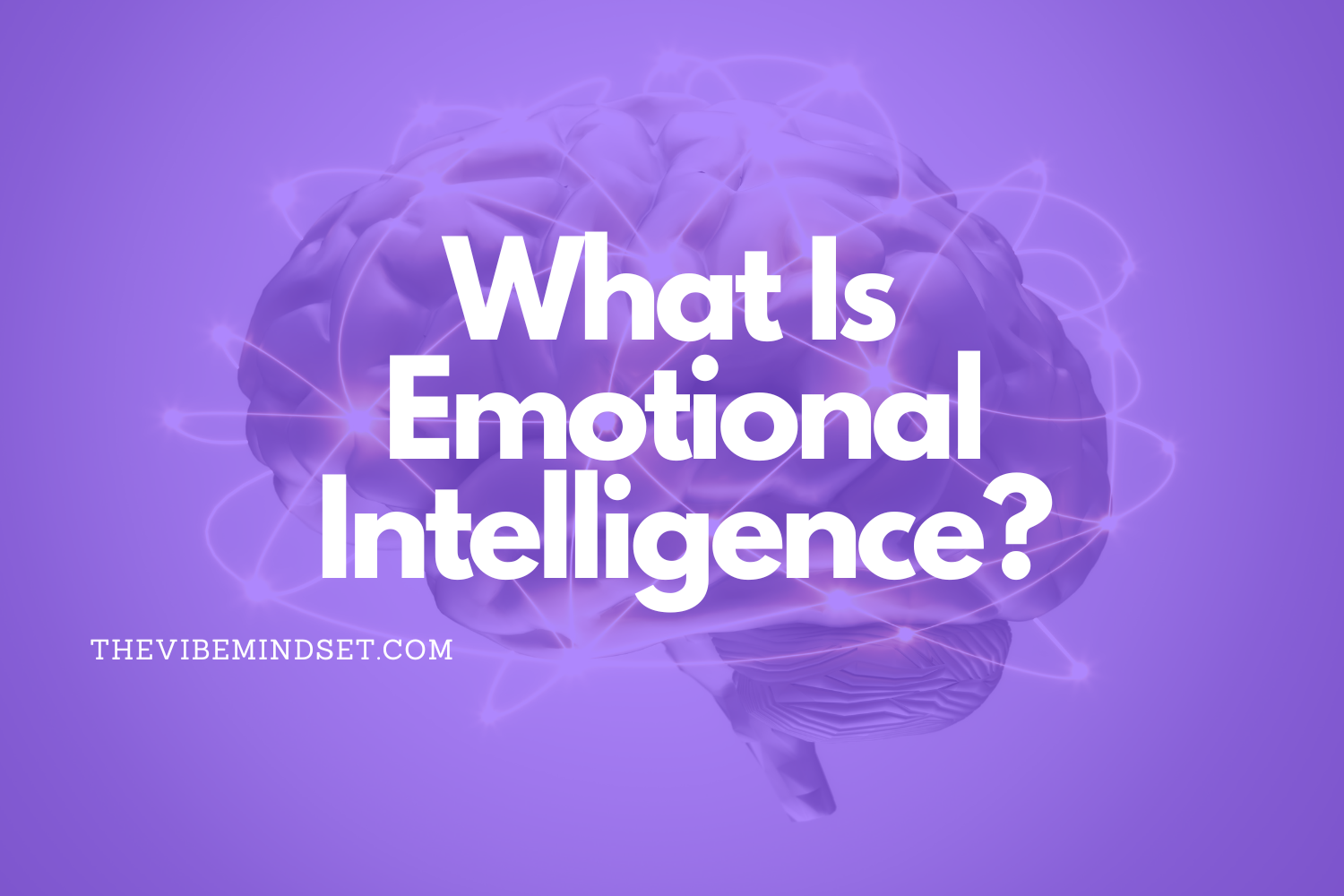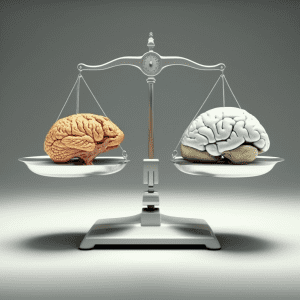Emotional intelligence is the ability to recognize, understand, and manage one’s own emotions and empathize with the feelings of others, and use this awareness to manage one’s own behavior and relationships effectively and constructively.
It involves perceiving, expressing, understanding, and regulating emotions and is considered more important than IQ for predicting success and happiness.
Emotional intelligence is a skill that can be developed and is not necessarily an inborn characteristic.
Table of Contents
What Is Emotional Intelligence Or EI/EQ?
What defines emotional intelligence is an awareness of your emotions paired with the skills needed to manage emotions.
Emotional intelligence is called EQ (emotional quotient) or EI.
An emotionally intelligent person does not necessarily have a strong intelligence quotient, yet they tend to have better mental health.
This is because the smartest people are not always in control of their own emotions.
Your IQ may help you get good grades in school; however, your EQ is the skill that allows you to best manage the stress of getting those good grades.
In fact, IQ tests and EQ tests differ quite a bit.
The former test focuses on your cognitive abilities, while the latter is focused more on your observational skills.
If you’re looking to better manage emotions at home or at work, you’ll have access to a toolkit at the end of this article to help you get started.
The History Of EI
The concept of EI has its roots in the work of early psychologists and philosophers.
Still, it was popularized in the 1990s by Daniel Goleman in his book “Emotional Intelligence: Why It Can Matter More Than IQ.”
The origins of EI can be traced back to the ancient philosophers, who recognized the importance of emotions in human life and the need to understand and regulate them.
For example, the Greek philosopher Aristotle wrote about the role of emotions in moral decision-making.
He argued that individuals who had the ability to reason about their emotions were more likely to act virtuously.
In the 20th century, psychologists systematically studied emotions and their impact on behavior.
In the 1960s, psychologist John Mayer and social psychologist Peter Salovey developed the concept of “emotional intelligence,” which they defined as the ability to process emotional information.
In the 1980s and 1990s, researchers started investigating the relationship between EI and various outcomes, such as job performance and leadership ability.
Daniel Goleman’s book “Emotional Intelligence” popularized the concept of EI and brought it to the attention of a wider audience.
Goleman argued that EI is a crucial component of success in life and that it can be developed and improved through training and practice.
Since the publication of Goleman’s book, the concept of EI has gained widespread attention and has been applied in various contexts, including education, business, and psychology.
Emotional Intelligence Statistics, Facts, And Quotes
There have been numerous studies on EI and its relationship to various outcomes. Here are some statistics on EI:
- This study reveals EI is negatively correlated with job burnout, while EI has a significant positive correlation with job performance, Source: nih.gov
- 90% of top performers have above-average emotional intelligence. Source: Harvard Business Review
- Emotional Intelligence is stated to be responsible for 58% of job performance. Source: Harvard Business Review
- People with a high degree of emotional intelligence make more money. An average of $29,000 more yearly than people with low emotional intelligence. Source: Harvard Business Review
- The link between emotional intelligence and earnings is so direct that every point increase in emotional intelligence adds $1,300 to an annual salary. Source: Harvard Business Review
- 75% of the Fortune 500 use emotional intelligence training.
- 61% of employers are more likely to promote workers with high emotional intelligence over candidates with high IQ. Source: CareerBuilder.com
- More than one-third of employers are placing greater emphasis on hiring and promoting people with emotional intelligence post-recession. Source: CareerBuilder.com
- 59% of employers would not hire someone with a high IQ but low EI. Source: CareerBuilder.com
- According to research by organizational psychologist Tasha Eurich, 95% of people think they’re self-aware, but only 10-15% percent actually are, and that can pose problems for your employees. Source: Harvard Business Review
- Daniel Goleman states, “When I compared star performers with average ones in senior leadership positions, nearly 90% of the difference in their profiles was attributable to emotional intelligence factors rather than cognitive abilities.”
- In a 1996 study of a global food and beverage company, McClelland found that when senior managers had a critical mass of emotional intelligence capabilities, their divisions outperformed yearly earnings goals by 20%.
- According to a CareerBuilder survey, 71% of employers value EQ over IQ because employees (and decision-makers) with elevated emotional intelligence are likelier to stay calm under pressure, resolve conflict, and treat co-workers with empathy. Source: CareerBuilder.com
It is important to note that these are just a few examples, and the relationship between EI and various outcomes may vary depending on the specific context and population studied.
Additionally, it is essential to recognize that EI is just one factor influencing these outcomes, and other variables may also contribute.
Why Is Emotional Intelligence Important?
EI is important because it affects many important life outcomes. Here are a few reasons why EI is important:
- Improved relationships: EI helps individuals better understand and manage their own emotions and the emotions of others, which can lead to more robust and positive relationships.
- Enhanced communication: EI allows individuals to communicate their emotions effectively and to understand and respond to the feelings of others, which can improve communication and facilitate conflict resolution.
- Increased job performance: Studies have shown that EI is related to job performance, with individuals who have higher EI often performing better in their jobs.
- Greater leadership effectiveness: EI is also related to leadership effectiveness, with leaders with high EI being more effective at leading and motivating their teams.
- Enhanced well-being: EI is associated with greater well-being and happiness, allowing individuals to manage emotions and cope with stress and challenges effectively.
Overall, EI is important because it helps individuals to navigate their relationships and environments effectively and to lead fulfilling and successful lives.
EQ is a strong indicator of good mental health but not so much one’s intellectual ability.
Your ability to manage stress and be aware of it in real-time places you in the driver’s seat of how you respond instead of the back seat.
People with strong emotional intelligence tend to respond instead of reacting.
They replace an automated reaction with a more well-thought-out response.
This skill allows people to become the master of their emotions as opposed to the slave to them.
Managing emotions is a strong indicator of one’s personal and professional life quality.
Self-awareness is the #1 skill most therapists and coaches seek to develop with their clients or athletes.
Research shows that a self-aware person is more likely to achieve success in their personal and professional life.
10 Benefits of Building Emotional Intelligence Skills
EI helps manage emotions, which is important because emotions are often how we describe our life, as emotions are the end product of experiences.
Here are some benefits of developing emotional intelligence and how to use them.
1 – Decision-Making
Mastering your emotions is essential because it’s one of the greatest influences on decision-making.
This is why it’s a critical trait of an effective leader or CEO.
2 – Conflict Resolution
The ability to diffuse a highly charged emotional interaction is a benefit of mastering your EQ.
Resolving conflict constructively builds trust, connection, and safety in relationships.
3 – Increased Motivation
Your ability to feel motivated and motivate those around you is another powerful benefit of boosting your EI.
High EQ invites paying attention to what motivates your team and what doesn’t.
4 – Leading Others
Becoming a strong leader, manager, or team member is one of the most recognized benefits of a high EQ in the workplace.
Strong emotional abilities among leaders are one of the most significant indicators of success within an organization’s leadership team.
5 – Improved Social Interactions
Your social skills will improve dramatically as your EQ improves.
Interpersonal skills are vital.
6 – Ability To Let Go
Releasing your attachment to emotions is an art and skill that can set you free from the feelings of your past.
Strong EQ allows people to let go more quickly to move forward.
7 – Mindfulness
Becoming more aware of the present moment is one of the most potent benefits of boosting your EQ.
The present moment is all we ever have, and when mastering your emotions, you spend less time in the past, less time in the future, and more time in the present.
8 – Improved Relationships
A solid interpersonal connection happens when you meet someone who gets you.
They understand how you feel and how you see things, and it builds a strong bond.
9 – Better Non-Verbal Communication
The nonverbal cues we exhibit are strongly correlated to the current emotional state we live in.
A dissatisfied boss may cross their arms, furrow their brow, and give off bad vibes.
Improved EQ helps us better recognize how we carry ourselves and how that impacts others.
10 – Emotional Self-Awareness
The most significant factor in determining the amount of emotional intelligence someone has starts with their ability to correctly interpret the emotions they feel.
An anxious person with poor emotional awareness will make poor decisions without recognizing the root cause unconsciously influencing their choices.
How To Improve in These 3 Circles Of Your Life
EQ can give you the ability to enhance all aspects of your life.
The big three circles you can influence are:
1. Your Health
Stress and anxiety are the #1 emotional complaints in the last 10-20 years.
Your level of stress has a direct impact on your level of health.
A study by X shows that better management of your emotions can greatly impact your mental and physical health.
2. Your Wealth
Many businesses and human resource directors use EQ as a part of their hiring process.
This is a powerful tool for better screening the candidates they are considering.
Emotionally intelligent people tend to perform better under stress and in fields where interpersonal skills are critical skills to master.
3. Your Relationships
Social intelligence is one of the most notable benefits of mastering your emotions.
This doesn’t just mean managing your own emotions yet also better understanding the feelings of others.
Greater emotional intelligence is a core finding in long-term relationships built with a solid emotional foundation.
The 5 Components Of Emotional Intelligence
These factors affect EI the most.
The five key emotional competencies are:
1 – Self-Awareness
Knowing thyself is, without question, the most significant factor in measuring one’s emotional quotient.
Awareness includes an observation of and curiosity regarding one’s thoughts, emotions, actions, purpose, aspirations, decisions, and values.
2 – Self-Regulation
Are you more the prisoner of your feelings or the prison guard in control?
The ability to recognize an impulse and decide whether to let it out of its cell or keep it locked up is an example of self-regulation.
3 – Empathy
The ability to understand and share the feelings of others.
This includes being able to perceive the emotional needs of others and respond with appropriate concern and care.
4 – Motivation
The ability to use one’s emotions to drive actions and behaviors.
People with high emotional intelligence are often highly motivated and able to pursue their goals with passion and determination.
5 – Social Skills
The ability to properly recognize and manage nonverbal cues in personal relationships.
This is one of the key skills required to enjoy a personal life filled with great friends you can trust and rely on.
What Are Good Examples Of Emotional Intelligence?
Higher EI is found in people with the following traits and skills.
Here are some good examples of EI.
7 Signs of High Emotional Intelligence
Here are signs of higher levels of EI.
- An empathetic person can understand other people’s feelings by seeing things from their perspective.
- The ability to let go quickly from emotionally charged experiences.
- A good listener.
- Open minded.
- Highly self-aware.
- Handle criticism well.
- They can apologize when they are wrong or make a mistake.
There are undoubtedly additional signs; however, these are the most noteworthy.
7 Signs of Low Emotional Intelligence
These are signs of low EI.
- Difficulty interpreting the emotions felt by another and reacting to them instead of responding.
- Remain attached to a failure or disagreement with continuous rumination and replay of the experience.
- Poor interpersonal skills at work or in a relationship
- A lack of sensitivity and understanding of the emotions felt by others.
- They tend to place blame on others without accepting responsibility.
- Mistakes and failure can greatly impact their sense of self.
- A tendency to argue more and hold a grudge.
It’s important to note that EI is not fixed and can be learned when you use proven strategies for developing it.
How Is Emotional Intelligence Measured?
Can emotional intelligence be measured?
The answer is YES!
There are several ways to measure it.
The most common method is self-report questionnaires, in which individuals are asked to rate their abilities or tendencies concerning various aspects of EI.
Some examples of EI self-report questionnaires include:
- The Emotional Intelligence Scale (EIS): This scale measures four dimensions of EI: emotional awareness, emotional expression, emotional management, and emotional regulation.
- The Mayer-Salovey-Caruso Emotional Intelligence Test (MSCEIT): This test measures four branches of EI: perceiving emotions, using emotions to facilitate thought, understanding emotions, and managing emotions.
- The Bar-On Emotional Quotient Inventory (EQ-i): This inventory measures five dimensions of EI: intrapersonal, interpersonal, adaptability, stress management, and general mood.
There are also other methods for measuring EI, including objective tests (such as tasks or simulations that measure EI-related skills), performance-based assessments (such as ratings of EI by supervisors or peers), and physiological measures (such as changes in heart rate or facial expressions).
It is important to note that no single measure of EI is considered definitive, and different measures may yield different results depending on the specific context and population being studied.
Additionally, some experts have questioned the validity and reliability of EI measures, and further research is needed to fully understand the strengths and limitations of different approaches to measuring EI.
Try One Of Our Free Emotional Intelligence Tests
Emotionally intelligent people receive an emotional quotient score between 70 and above.
This helpful report is only a basic guideline to explain the types of questions asked on a more formal test.
***Note: Test is being revised and updated for 2023 – ETA Mid-January!***
Emotional Intelligence Training
EI training can help improve the skills of leaders, management, teachers, coaches, students, and athletes.
Improving EI starts with an emotional intelligence training program that is clear, easy to understand, and actionable.
Building your EQ invites you to own emotions instead of allowing them to own you.
Check out our emotional intelligence coach Dr. Jay Cavanaugh.
You can learn to be more emotionally intelligent as it’s considered a skill more than a given trait or characteristic.
The skills to master to improve your emotional intelligence are not difficult to master, yet breaking your habitual patterns is!
Here are our most popular resources and training tools to build your emotional intelligence skills and master your emotions.
Emotionally intelligent people are experts in business management as well as relationship management.
Their ability to interpret nonverbal communication cues, recognize body language cues and identify the emotional states of others are just a few crucial skills required to be an effective leader.
Download Our Emotional Intelligence Toolkit PDF
Start managing your emotions better with our EI Toolkit PDF.
***Note: Toolkit is being revised and updated for 2023 – ETA Mid-January!***
- 5 Components Of Emotional Intelligence [WHAT ARE THEY?] - January 2, 2023
- 20 FREE Emotional Intelligence Images [For You] - January 2, 2023
- Low Frustration Tolerance: What Is It & [HOW TO IMPROVE] - December 31, 2022
















